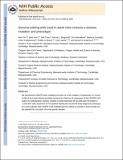Genome editing with Cas9 in adult mice corrects a disease mutation and phenotype
Author(s)
Yin, Hao; Xue, Wen; Chen, Sidi; Benedetti, Eric; Grompe, Markus; Kotelianski, Victor E.; Bogorad, Roman; Sharp, Phillip A.; Anderson, Daniel Griffith; Jacks, Tyler E; ... Show more Show less
DownloadAnderson_Genome editing.pdf (844.2Kb)
PUBLISHER_POLICY
Publisher Policy
Article is made available in accordance with the publisher's policy and may be subject to US copyright law. Please refer to the publisher's site for terms of use.
Terms of use
Metadata
Show full item recordAbstract
We demonstrate CRISPR-Cas9–mediated correction of a Fah mutation in hepatocytes in a mouse model of the human disease hereditary tyrosinemia. Delivery of components of the CRISPR-Cas9 system by hydrodynamic injection resulted in initial expression of the wild-type Fah protein in ~1/250 liver cells. Expansion of Fah-positive hepatocytes rescued the body weight loss phenotype. Our study indicates that CRISPR-Cas9–mediated genome editing is possible in adult animals and has potential for correction of human genetic diseases.
Date issued
2014-03Department
Massachusetts Institute of Technology. Institute for Medical Engineering & Science; Harvard University--MIT Division of Health Sciences and Technology; Massachusetts Institute of Technology. Department of Biology; Massachusetts Institute of Technology. Department of Chemical Engineering; Koch Institute for Integrative Cancer Research at MITJournal
Nature Biotechnology
Publisher
Nature Publishing Group
Citation
Yin, Hao, Wen Xue, Sidi Chen, Roman L Bogorad, Eric Benedetti, Markus Grompe, Victor Koteliansky, Phillip A Sharp, Tyler Jacks, and Daniel G Anderson. “Genome Editing with Cas9 in Adult Mice Corrects a Disease Mutation and Phenotype.” Nature Biotechnology 32, no. 6 (March 30, 2014): 551–553.
Version: Author's final manuscript
ISSN
1087-0156
1546-1696